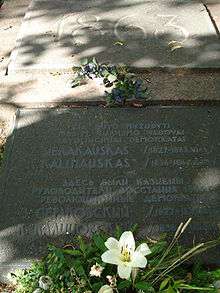Konstanty Kalinowski

Wincenty Konstanty Kalinowski, also known as Kastuś Kalinoŭski (Belarusian: Касту́сь Каліно́ўскі[1]), Konstanty Kalinowski (Polish) and Konstantinas Kalinauskas (Lithuanian) (21 January or 2 February 1838 – 22 March 1864), was a 19th-century writer, journalist, lawyer and revolutionary. He was one of the leaders of Belarusian, Polish and Lithuanian national revival and the leader of the January Uprising in lands of the former Grand Duchy of Lithuania in the Polish-Lithuanian Commonwealth.
Life
Konstanty Kalinowski was born to an impoverished Belarusian szlachta (noble) family of Szymon Kalinowski, a manager of the Mostowlany farm and manor, which is now a village in the Podlaskie Voivodeship, Poland. The Kalinowski family hailed from the region of Mazovia (Polish: Mazowsze) and bore the Kalinowa coat of arms. After graduating from a local school in Świsłocz (now Svislach in Belarus) in 1855 he went to Moscow, where he started studying at private law school. Soon he moved to St. Petersburg, where he continued his studies at the University of St. Petersburg and got involved in several Polish students' conspiracies and secret cultural societies. After graduating in 1860 he returned to the area of Hrodna, where he continued to work as a revolutionary.
He also started publishing Mużyckaja praŭda (Peasant's truth), one of the first periodicals in Belarusian (written in lacinka) and two other Polish language clandestine newspapers. In his literary work, Kalinowski underlined the need to liberate all peoples of the former Polish-Lithuanian Commonwealth from Russia's occupation and to conserve and promote the Greek-Catholic faith and Belarusian language. He also promoted the idea of activisation of peasants for the cause of national liberation, the idea that was until then dominated by the gentry. He also referred to the good traditions of democracy, tolerance and freedom of the Polish-Lithuanian Commonwealth, as opposed to national oppression of cultures dominated by Imperial Russia.
After the outbreak of January Uprising he was involved in the secret Provincial Lithuanian Committee in Vilnius (Prowincjonalny Litewski Komitet w Wilnie). Soon he was promoted to the commissar of the Polish government for the Grodno Voivodeship. His writings made him popular both among the peasants and the gentry, which enabled the partisan units under his command to grow rapidly. Because of his successes he was promoted to the rank of Plenipotentiary Commissar of the Government for Lithuania (Komisarz Pełnomocny Rządu na Litwę), which made him the commander-in-chief of all partisan units fighting in the areas of today's' Eastern Poland, Lithuania, Belarus and Ukraine.

However, after initial successes against the Russian armies, the Russians moved a 120,000 men strong army to the area and the revolutionaries started to lose most of the skirmishes. Finally Kalinowski was betrayed by one of his soldiers and handed over to the Russians. He was imprisoned in Vilnius, where he wrote one of his most notable works - the Letter from Beneath the Gallows (Pismo z-pad szybienicy), a passionate credo for his compatriots. He was then tried by a court martial for leading the revolt against Russia and sentenced to death. He was publicly executed on Lukiškės Square in Vilnius on 22 March 1864.
Thanks of his involvement in liberation of the nations of Central and Eastern Europe, he is considered to be a national hero of Belarus, Lithuania and Poland alike.
Related reading
- Jan Zaprudnik, Thomas E. Bird: Peasant's Truth, the Tocsin of the 1863 Uprising in: Zapisy Belarusian Institute of Arts and Sciences. Vol. 14. New York, 1976
- Kastuś Kalinoŭski, commentaries by Jan Zaprudnik and Thomas E. Bird: The 1863 Uprising in Byelorussia: "Peasants' Truth" and "Letters from Beneath the Gallows". Byelorussian Institute of Arts and Sciences, The Krecheuski Foundation, New York, 1980
References
- ↑ The name Kastus began to be used in the 20th century.
External links
| Wikimedia Commons has media related to Konstanty Kalinowski. |
![]() Belarusian Wikiquote has quotations related to: Kastuś Kalinoŭski
Belarusian Wikiquote has quotations related to: Kastuś Kalinoŭski
|